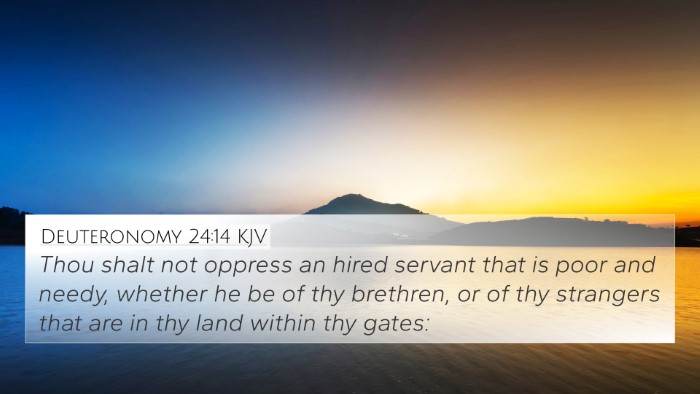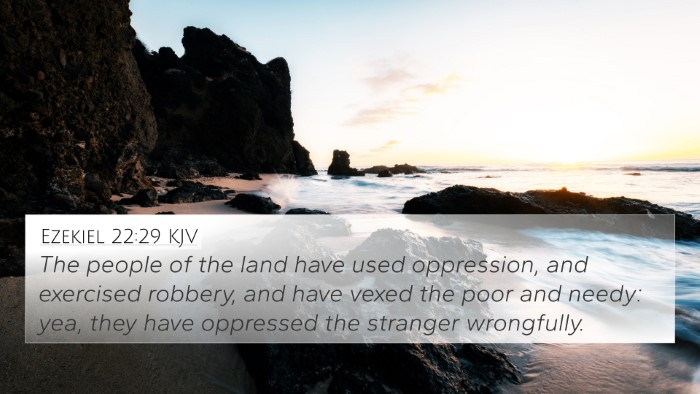Understanding Leviticus 19:33
Verse: "And if a stranger sojourn with thee in your land, ye shall not vex him."
This verse emphasizes the importance of treating sojourners and strangers with kindness and respect. It is part of the larger ethical directives given in the Law of Moses for the Israelites.
Commentary Insights
Matthew Henry's Commentary
Matthew Henry articulates that this command reflects God's concern for the vulnerable and the foreigner. He highlights that the Israelites, having been strangers in Egypt, should empathize and extend compassion to those who live among them. This fosters a community built on mutual respect and kindness.
Albert Barnes' Notes
Albert Barnes emphasizes the broader principle of justice and love in this scripture. He observes that the Hebrew term for "vex" indicates causing distress or injury, which should not be inflicted upon strangers. Instead, they are to be treated as equals, illustrating the moral obligation to uphold justice and benevolence.
Adam Clarke's Commentary
Adam Clarke points out that this command is rooted in the principle of love your neighbor. He suggests that the treatment of strangers reflects the ethical standards of the community. By ensuring that strangers are not mistreated, the Israelites would demonstrate their commitment to righteousness.
Connections Between Bible Verses
Leviticus 19:33 provides a critical principle that finds resonance throughout the scriptures. Below are relevant Bible verse cross-references that highlight the thematic connections with this verse:
- Exodus 22:21 - "You shall not wrong a stranger or oppress him, for you were strangers in the land of Egypt." This verse reinforces the idea of empathy towards strangers, rooted in the Israelites' own experiences.
- Deuteronomy 10:19 - "Love ye therefore the stranger: for ye were strangers in the land of Egypt." This echoes the call to love and protect the foreigners.
- Matthew 25:35 - "For I was hungry, and you gave me meat: I was thirsty, and you gave me drink: I was a stranger, and ye took me in." This New Testament verse highlights the continuity of the principle of hospitality toward strangers, emphasizing its spiritual dimension.
- Hebrews 13:2 - "Be not forgetful to entertain strangers: for thereby some have entertained angels unawares." This passage encourages hospitality, linking back to the value placed on treating strangers well.
- Leviticus 19:34 - "But the stranger that dwelleth with you shall be unto you as one born among you, and thou shalt love him as thyself." This directly links to the previous verse and emphasizes the equality of the stranger.
- Luke 10:36-37 - The parable of the Good Samaritan reiterates the importance of helping those who are marginalized or in need, which relates back to the command in Leviticus.
- Romans 12:13 - "Distributing to the necessity of saints; given to hospitality." This New Testament exhortation encourages believers to maintain a lifestyle of hospitality and care for others.
Bible Verse Parallels and Thematic Connections
This verse not only provides a moral guideline but also serves as a cornerstone for understanding broader scriptural teachings about community, compassion, and justice.
By cross-referencing biblical texts, we gain deeper insights into these themes:
- Compassion: Understanding the plight of strangers leads to a compassionate heart, aligning with Christ's teaching of love.
- Justice: God's directions for social justice reflect His divine nature and character.
- Community Ethics: The communal aspect of following God's law creates an environment of care and inclusion.
Bible Study Methods for Exploring Cross-References
Tools for Bible cross-referencing can enhance one’s understanding of scripture. Here are some recommendations:
- Bible Concordance: A concordance is essential for locating specific terms and phrases across the scripture.
- Bible Cross-Reference Guide: Such guides provide systematic links between related verses.
- Cross-Reference Bible Study: Engage with thematic studies that connect verses based on shared concepts.
- Comprehensive Bible Cross-Reference Materials: Utilize annotated Bibles that provide insights and connections directly on the page.
Conclusion
The understanding of Leviticus 19:33 extends beyond a mere social directive; it is a profound moral principle that speaks to the heart of the believer. By treating strangers with love and respect, one actively participates in the overarching narrative of the Bible that commands love, justice, and community.










